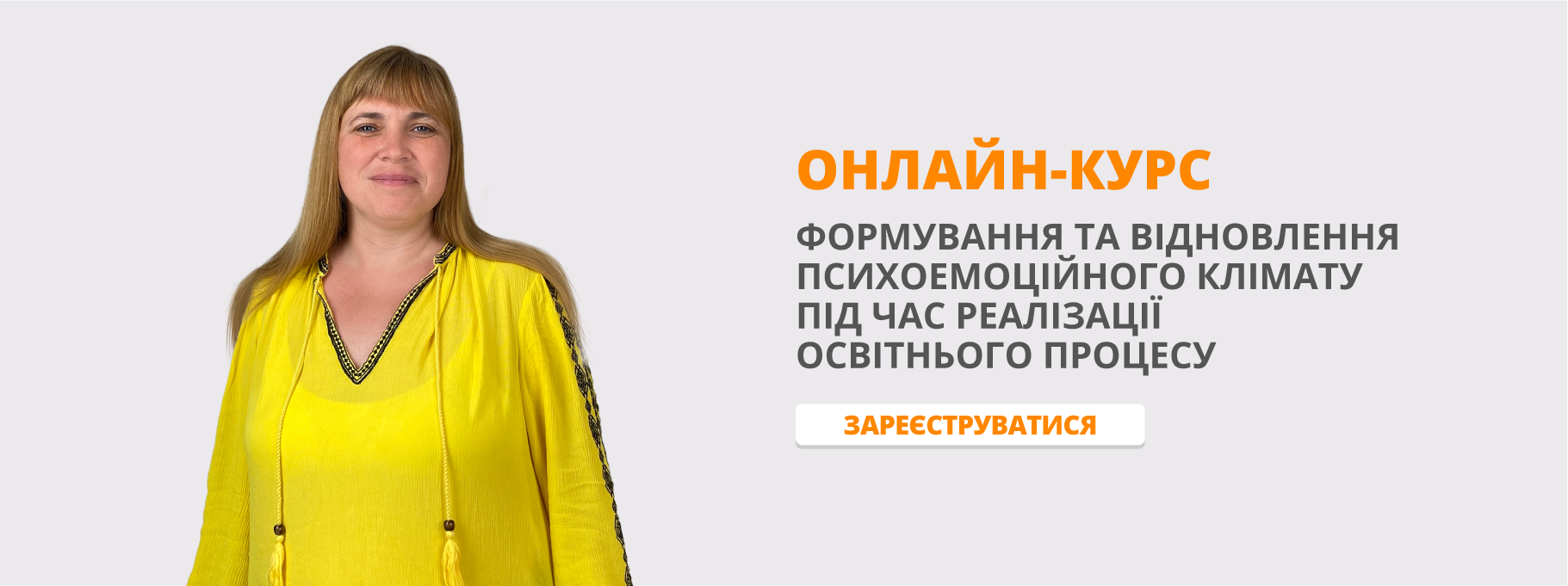Конспект уроку з аглійської мови для 4, 5 класу на тему "Pupils' activities "
з досвіду роботи, щодо забезпечення наступності у навчанні англійської мови
Навчити учнів вживати ЛО у мовленні, збагачення словникового запасу.
Розвивати мовленнєві здібності, комунікативні навички, фонематичний слух.
Розвивати вміння самостійно працювати з різноманітними засобами навчання.
Формувати такі риси характеру, як доброзичливість, колективізм, толерантність, працьовитість.
Pupils’ activities
(4th form)
Мета:
Навчити учнів вживати ЛО у мовленні, збагачення словникового запасу.
Розвивати мовленнєві здібності, комунікативні навички, фонематичний слух.
Розвивати вміння самостійно працювати з різноманітними засобами навчання.
Формувати такі риси характеру, як доброзичливість, колективізм, толерантність, працьовитість.
Greeting
T: Good morning, pupils! Are you ready for the lesson? How are you? Are you fine?
Aim: Today you will remember the names of school lessons and discuss what you do at each of them, what lesson you like and which of them is you favourite one.
Чого б ви хотіли навчитися на уроці, виходячи з теми уроку. What do you want to learn at this lesson? (відповіді дітей).
Warming up
T: What do pupils do at the lessons? Let’s read the poem
I am learning to write
And I am learning to spell
And my teacher says
That I am doing very well.
Vocabulary practice
T: Listen and say after me.\
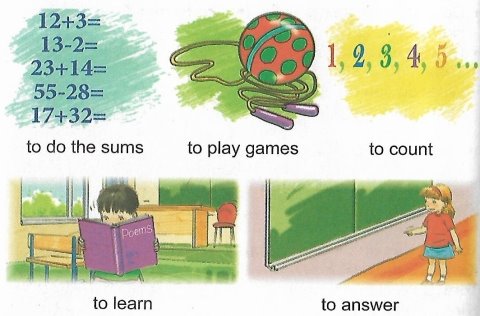
Reading
T: Read the text and answer the questions
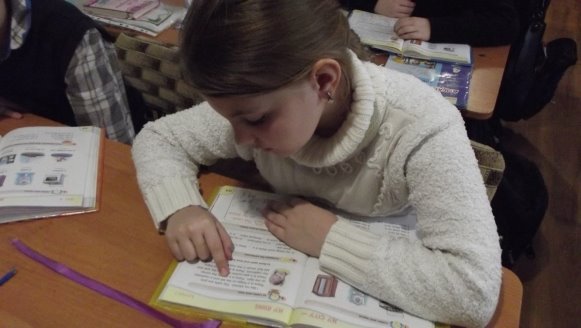
Classmates
Ann and Dan are classmates. They are in the fourth form. They go to school from Monday to Friday. They usually have five lessons a day. They learn Ukrainian, Reading, Maths, Art, Music, PE, Nature Study and Computer Studies. They read and write at the Ukrainian and English lessons. They do the sums at Maths. Pupils do sports, skips, play games at Sport lessons. They draw the pictures with pencils and paint with …. at Art lessons. They listen to their teacher at every lesson.
1. How many lessons do the pupils have?
2. What do they do at the Maths lessons?
3. What do they do at the Sport lessons?
4. What do they do at the Art lessons?
5. What do they do at the English lessons?
Speaking
T: Listen, read and act out.
At the Art lesson
Kim: Can you give me your paints, please?
Tom: Yes, sure. What colours?
Kim: Green yellow blue and pink,
Tom: OK. Here you are.
Kim: Thanks a lot.
Jane: What do you want to draw?
Kim: Some flowers.
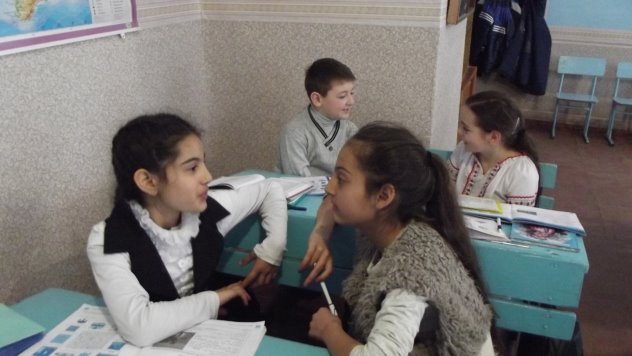
Writing
TASK1
T: Choose and write.
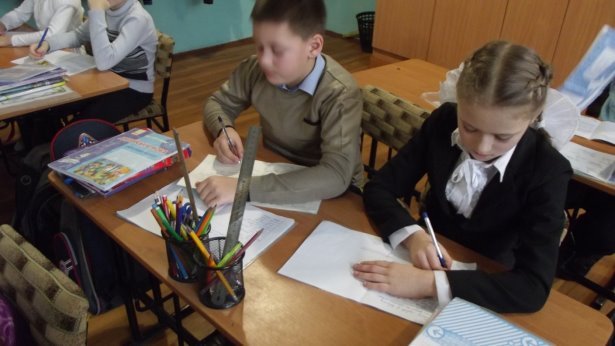
- We … at the Maths lessons.
a. read the texts b. do the sums and count c. run
2. Pupils … at Computer Studies lessons.
a. write words b. learn poems c. play computer games
3. Our English teacher usually …. at the lessons.
a. asks questions b. listen to the teacher c. draws the pictures
4. Olena ….. at the Nature Study lessons.
a. speak English b. sing songs c. learns about trees and flowers
TASK 2
T: The next task is to write the names of school subjects under each pictures and what you usually do at these lessons.
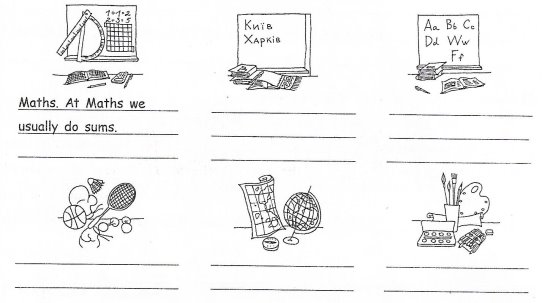
Physical activity
T: Are you tired? Let’s have a rest.
Look left, look right
Look up, look down
Look around.
Look at your nose
Look at that rose
Close your eyes
Open, wink and smile.
Your eyes are happy again.
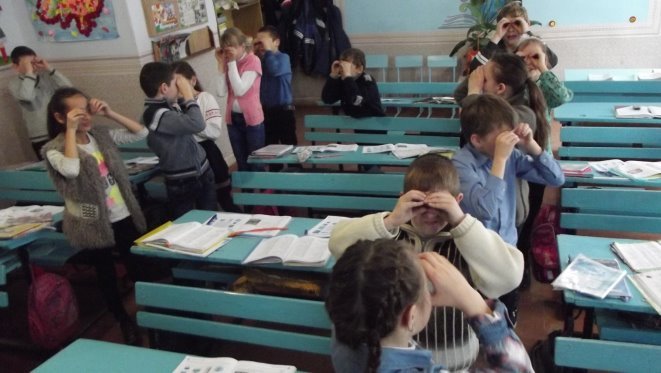
Game
T: Imagine that you are the headmaster of your school. Write some school rules for the pupils and teachers. They may be funny.
Example:
SCHOOL RULES
|
Pupils can go to school without uniform Pupils can run in the corridor. Pupils can talk in the library. |
Teachers should wear uniform. Teachers should play in the class. Teachers should sit still at the lesson. |
Game “At school” (сard)
Учитель поділяє клас на дві команди. Кожна команда отримує картки із завданням, яке треба інсценувати. Учень зображує навчальну дію зазначену на його картці, а команда відгадує
Example: Team: Are you writing?
P1: No, I am not.
Team: Are you doing exercises?
P2: Yes, I am.
|
You are doing exercises. |
You are playing music. |
|
You are writing. |
You are running. |
|
You are reading. |
You are doing sums. |
|
You are listening to stories. |
You are drawing. |
|
You are counting. |
You are playing games. |
Listening
T: Listen and write the numbers.
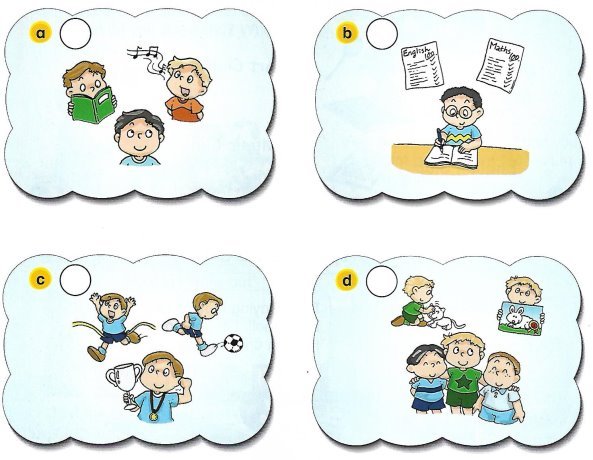
1. This is John. He plays football. He likes running. He is good at sport.
2. This is Billy. He has lots of friends. He likes animals. He is good at drawing.
3. This is Paul. He is good at Maths and English. He likes thinking and writing.
Summing up
T: So, my dear friends the lesson is over. Let’s sum up the results of our work.
We worked very well. Скажіть, що ми вивчили на уроці? Для чого? Чого навчилися робити ? Які завдання сподобались? What have we learned today? Your marks are … .
Homework
Write activities at the English lesson.
Pupils’ activities
(5th form)
Мета:
Закріпити вивчені лексичні одиниці з теми.
Удосконалювати навички аудіювання.
Розвивати навички монологічного та діалогічного мовлення.
Розвивати навички писемного мовлення . Поглибити знання учнів про особливості англійської мови.
Прищеплювати інтерес до вивчення англійської мови через використання нестандартних методів проведення уроку.
Greeting:
Good morning, pupils! How are you? Are you ready for the lesson?
Aim: At the today’s lesson you will voyage to the country of knowledge of English words. So, pupils, let’s have a look at the blackboard. What do you see on it? (на дошці роздаткові картки “Pupils activities”). So, tell me what we are going to talk about at our lesson (відповіді дітей). Thank you. Well, the topic of our lesson today is” Pupils activities”.
Warming up
T: Which classroom activities are you good at?
Do you like Maths? Do you like doing sums?
Are you good at writing letters?
Vocabulary practice
T: Look at the pictures and say what the children do at the lessons.
|
Activities #to count # to do the sums # to calculate # to read books # to do exercises #to draw pictures # to paint #to listen poems # to sing songs # to speak with classmates # to use paints # to do exercises |
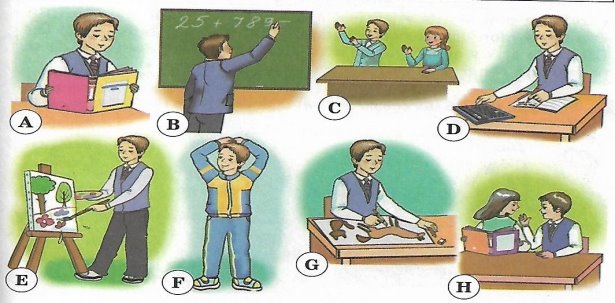
Speaking
T: Say what do pupils do at the lessons (card)
Example: The pupils jump, run, play different games at the PE lessons.
|
History |
play games, skip, run |
|
Ukrainian |
do sums, solve problems |
|
PE |
sing songs, listen to music |
|
Maths |
read and translate texts |
|
Geography |
learn about our country |
|
English |
write dictations |
|
Music |
learn about trees and flowers |
|
Handicrafts |
paint pictures |
|
Art |
learn about Earth |
|
Nature Study |
make different things from wood |
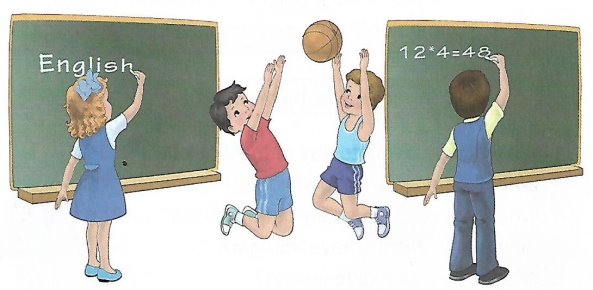
Work in groups
Вчитель роздає картки із розкладом уроків. Їх три види, тому в деяких учнів вони збігаються. Їх завдання --- знайти однокласників, у яких такий самий розклад . Учні пересуваються по класу й питають один в одного: “What lessons do you have on Monday/ Wednesday? When is Maths /English in you class? Do you have PE, Art on Tuesday? “ Клас”, який збереться в повному складі першим, виграє.
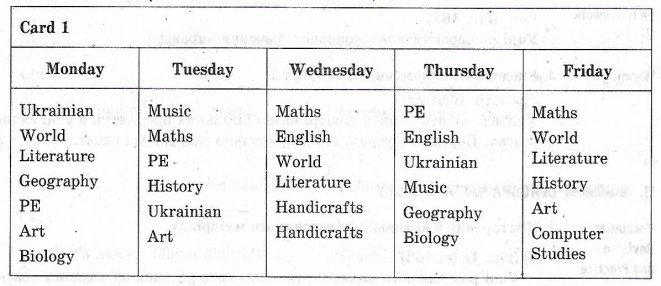
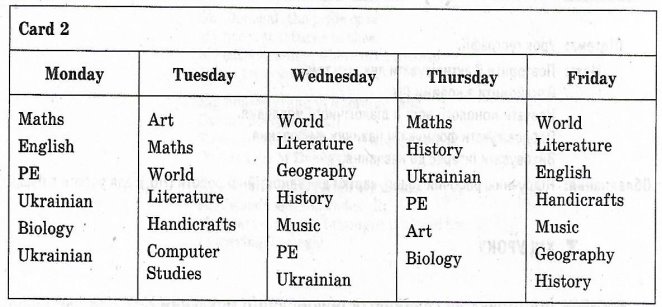
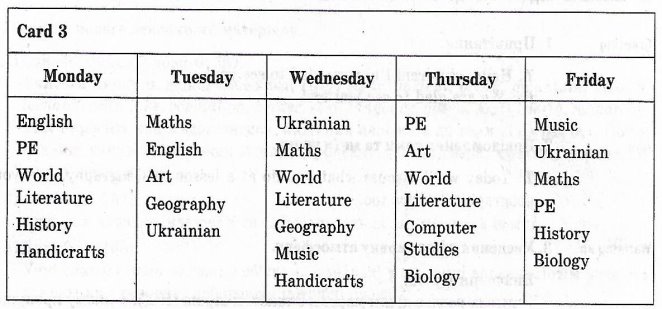
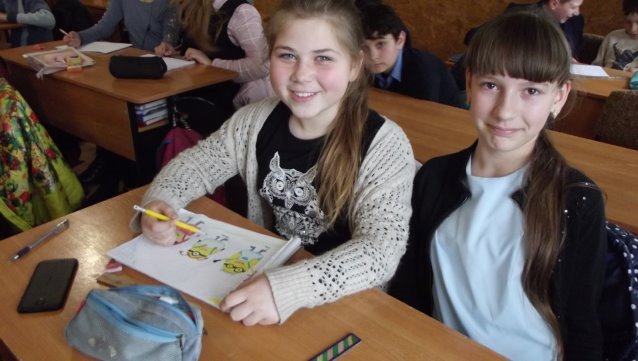
Reading
T: Read and complete the text about Alex’s school day. Put the verbs in brackets
into the correct tense form.
Alex’s school day
I am Alex. I am 10 and I am in the fifth form at school #3. It (0) was Monday yesterday. What a terrible day it (1) ….. (to be) ! I (2)…..(to wake) up late and (3) …..(not / to have) time to eat my breakfast.
The first lesson was Maths. I am not very good at Maths .The next lesson was French. I (4) …. (.to like) French, but I hate doing grammar exercises! After the break we (5)….. (to have) two lessons of English! I (6) ….. (to forget) to d my homework. After English we had some time for lunch. Then we had the history lesson. The last lesson was my favourite lesson of PE. We (7) …. (to play) football! It was great! At 2.15 I (8) ….. (to go) home.
Writing
(pairs work)
T: Write a list of questions to ask your friend about the school subjects.
*English *Ukrainian Literature *Art *History *Maths *PE *Handicrafts *Music
Activities
*calculating *doing the sums *reciting poems *reading stories *singing songs *drawing flowers *playing games * writing compositions * learning about our country *making different things from wood
Example:
A: What is your favourite subjects? Why do you like it?
B: My favourite subject is ….. because ….. .
Group work
T: What words about school life do you know? Write the words on the blackboard. Two or three words in each cloud.
Well done, pupils. Now look at the words and read them all together/
The first group – sentences #1 and #2.
The second group – sentences #3 and #4.
The third group – sentences #5 and #6.
The fourth group – sentences #7 and #8.
Listening
T: Listen and match the speakers (1-4) to the activities (A-D) they do at the English lessons.
Speaker 1. As for me learning English is great fun. We do different exercises, read the text, sing songs and speak a lot. My favourite activity in class is listening to the English songs. I really like Music. I think that it’s easier to learn a song than a poem.
Speaker 2. Our English lessons are fantastic! I like them very much. It’s not easy for me to write in English, but I enjoy playing communicative and language games. I also like to role some situations or stories.
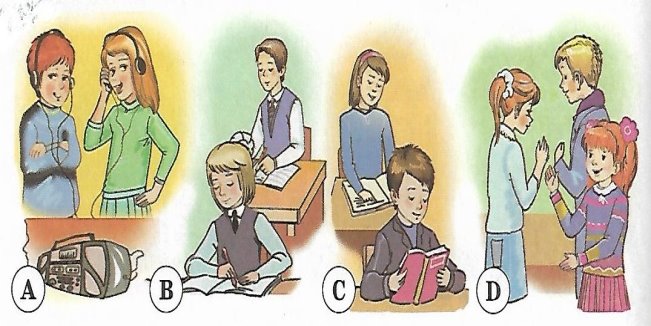
Speaker 3. I think learning English is difficult. I have problems with spelling and pronunciation. But I work hard to know this language well. Many people speak English nowadays. I think that reading is quite a boring activity, but you have to read if you want to know the language.
Speaker 4. I really like my English lessons. I like to work on the classroom projects together with my classmates. But learning a language is hard work. You have a practice every day. Besides, there is sometimes a grammar test which is not great fun. You must be very attentive at the lessons and do your homework on time.
Summing up
T: Let’s sum up our lesson. What did we speak about at the lesson today? What task did you like most? I think that our work was successful and very useful for you. Your marks are… .
Homework
Write about your English lesson.
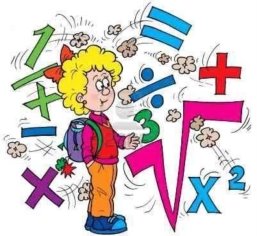


про публікацію авторської розробки
Додати розробку
